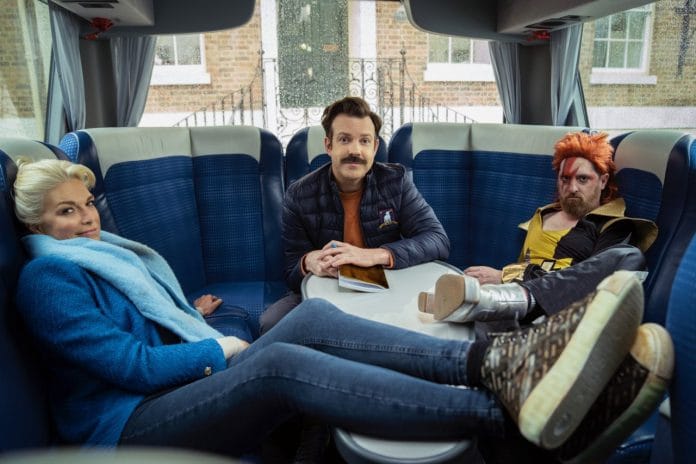Apple TV+’s flagship series Ted Lasso has come to an end, just about three years after Jason Sudeikis and company gave people a much-needed feel-good distraction from the global Covid-19-induced pandemonium.
Without getting into spoilers about how we bade adieu to Ted Lasso (Sudeikis), the show’s goofy titular character with a heart of gold, and the fictional Premier League football club AFC Richmond, it would be fair to say that the third season finale, titled So Long and Farewell, is definitively emotional and bittersweet – for die-hard fans.
Season three misses the mark
The story of season three isn’t in how it ended – it lies in the multitude of missteps made in getting there, as the final product of a protracted writing and filming period was a far cry from the two high-quality seasons that preceded it.
Make no mistake; Ted Lasso was always a cheesy sitcom with a lack of realism baked into its premise of a university-level gridiron coach from Kansas moving to London with his best friend to take up the job of coaching a struggling, dysfunctional AFC Richmond.
For two seasons, it was within this sickly-sweet and hilarious premise that series co-creators Sudeikis, Bill Lawrence, Brendan Hunt and the rest of their writers’ room induced very real emotional reactions toward the show’s storylines, character arcs and interpersonal relationships.
The third season, however, grappled with filming delays, rewrites and reshoots, leading to an 18-month gap between the season two finale and the start of season three.
For instance, Russia’s invasion of Ukraine affected the ownership of Chelsea Football Club –a crucial filming location for the early part of Ted Lasso’s third season.
Then, according to Puck News, Lawrence, one of the key show developers, exited the production to focus on Shrinking, another Apple TV+ comedy-drama series. As a result, Sudeikis gained more control and oversaw a writers’ room featuring several new faces and subsequent rewrites.
While we can’t claim to know the inner workings of television production and writing teams, the effects of this change seem apparent through the third season.
Ted Lasso’s 30-minute episodes gave way to 60-minute ones in season three, taking away from the show’s much-loved short and sweet element.
While longer runtimes worked to the series’ benefit in season two, the writers squandered the extra time in this instalment as the storytelling, though ambitious on paper, is more like “butter scraped over too much bread” in terms of execution.
Multiple new characters have been brought in to shake up the preceding dynamics and to satirise aspects of the football world, like cartoonishly arrogant star players and volatile vice-captains. The humour involving these new additions works at first but their roles in the storyline are, more often than not, frustratingly predictable and full of sitcom tropes before being written out abruptly.
Also read:
Dwindling character arcs, sub-plots
When it comes to the pre-established characters, the worst-handled arcs are those of Keeley Jones (Juno Temple) and Nathan Shelley (Nick Mohammed), both of whom departed the football club at the end of season two to try and enjoy better forms of employment elsewhere.
Not only is far too much time and focus taken away from AFC Richmond players and staff, but it is also disappointing given how the Richmond-focused storylines are better than Keeley’s or Nathan’s. The chemistry between players and staff members remains spot on, but the focus continues moving away from the original show narrative that centred around Richmond’s on-field results and weakening league position.
It’s no coincidence that Keeley and Nathan did not appear in the best episode of the third season and one of the series’ finest hours, Sunflowers. It is the only episode focusing solely on members of AFC Richmond, and a beautifully layered zany love letter to Amsterdam penned by Hunt, who spent his formative comedy years in the Dutch capital.
Aside from the near-perfect Sunflowers, the rest of the season can be described as lovely moments of character development and foreshadowing dialogue paired with mind-numbing subplots straight out of a telenovela.
The most telenovela feature is the revelatory new relationship of Ted’s ex-wife Michelle (Andrea Anders). It is so poorly handled and out of the blue that it could be uncharitably read as Sudeikis projecting his real-life marital problems onto his show.
Football fanatics will find it easy to spot the season’s many references, some clever and others tacked on, such as Zlatan Ibrahimovic, Johan Cruyff, the European Super League and Total Football. But these fun Easter eggs are relatively fleeting in the context of a season that wants to have powerful resolutions everywhere without putting the nuanced storytelling and character development to get there.
The first two seasons were critically acclaimed, featured prominently in award ceremonies, and won four back-to-back Emmys. But it will be sadly disrespectful to the other shows if this season of Ted Lasso performs similarly well on the awards circuit this year.’
(Edited by Zoya Bhatti)






